On our way to our next stop near Siena, we stopped in Florence and spent most of the day exploring. We started at a church, San Salvatore al Monte, and cemetery across the Arno from the main part of Florence with great views of the city. We took a quick peak into the church before Sunday services started, then headed down the hill. Our next stop was Piazzale Michelangelo with 180 degree views of the city from a slightly lower level. From there, we walked through a rose garden with contemporary sculptures and down through the city walls into old Florence.
 |
| Cemetery for famous people at San Salvatore al Monte |
 |
| Lynn in front of the church |
 |
| Inside the church |
 |
The floor in the church was inscribed
everywhere you looked. |
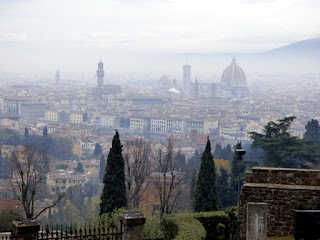 |
| The Duomo, Bapistry, and City Hall from S. Salvatore |
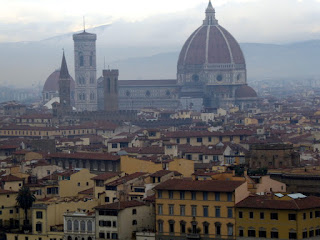 |
The Duomo, Bapistry, and City Hall from Piazzale Michelangelo
a little later and lower as the fog cleared. |
 |
| The remains of the city wall in the fog. |
 |
| Ponte Vechhio (with the building on it) |
 |
Suitcase with the ship inside signifying that you used to
bring home postcards from your trip. |
 |
| Jim's new best friend |
 |
| Interesting fountain |
 |
Gate thru the old wall to the Unesco Heritage
part of the city. |
We avoided crossing the only bridge not bombed out during WWII, Ponte Vecchio (Old Bridge), because it was jammed with tourists and got a nice view of it instead. During the time of the Medicis, the bridge was populated by fisherman. The Medicis were not happy walking through the commoners to go from the city hall to their homes on the hills on the other side of the Arno, so they displaced the fisherman, brought in gold workers, and built a walkway above it all from the city hall to the hills of their homes so they could totally avoid the people they ruled.
 |
| Ponte Vecchio |
 |
In 1966, there was a nasty flood here. The water
and mud reached to the middle of the white marker. |
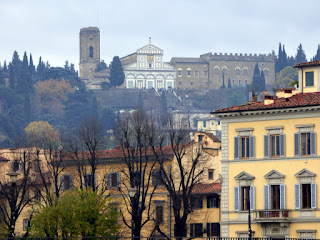 |
| San Salvatore al Monte, where we started. |
We walked past the Gallileo Museum with a wonderful sort of monthly clock that showed which astrological area you were in and thru the open center of the Uffizi Museum (uffeszi means office and these were originally city offices with a private museum of Medici art on the top floors) to the Piazza Vecchio, the town hall square which is home to a LOT of famous sculptures. There is a copy of Michelangelo's David there. The original used to reside at the entrance to the city hall, but environmental impacts led them to build a museum for it and put a replica in its place.
 |
Galilleo month marker. Cancer and Leo are
the first 2 lines |
 |
| Fake David outside the city hall |
 |
| Another copy of a famous sculpture |
 |
Original bronze sculpture of the death of
Medusa. Many bronze sculptures in Europe
were melted down for armaments during WWI. |
 |
In the background Cosimo I of the Medicis. In the
foreground, part of the Neptune Fountain and Piazza
Vecchio |
| |
From there, we walked to Santa Croce, the church where Michelangelo and Gallileo were buried. Because it was Sunday, access to the church was limited until after the services. This was the place where we were to meet for our bus to Siena, giving us three full hours to explore on our own.
 |
| Statue of Dante at Santa Croce |
We had made arrangements before hand to go to the Galleria dell' Accademia, where the original David is displayed, so we took off for the half mile jaunt to the museum. We had a timed ticket and arrived 20 minutes early, but it was so quiet, they let us in right away and we spent about 45 minutes not only ogling the David, but other works as well. We discovered a Museum of Musical Instruments and found a great collection that included the early and late variations of cellos, a Stradivarious violin, a couple violas, a hurdy gurdy, an oval piano, and 4 harpsicords, including a vertical one.
 |
We didn't completely follow directions to the
museum, turning a block early, and discovered
this interesting fountain (detail above, overview
below) that we never would have discovered
otherwise. |
 |
| The original of the statue we saw at the Piazza. |
 |
One of several Michelangelo works that were
never completed. We loved seeing how the
figures emerged from the stone. |
 |
| Another uncompleted Michelangelo work. |
 |
| David original. The level of detail was amazing. |
 |
An adjunct gallery had plaster sculptures that
were sort of practice for the real thing. The
dots facilitate any readjustments needed on the design. |
 |
| A piano lute |
 |
| The Hurdy Gurdy |
 |
Vertical harpsicord, intended to take less
space in a room. |
 |
| Original layout of a harpsichord |
 |
| Oval Piano |
 |
| One last look at David in his gallery. |
By then, it was approaching 2 pm and we were getting hungry, but most of the food options were ice cream, which was not what we needed. I finally broke down and ate one of my nut bars before we wandered around a combination food and Christmas market. We got a chocolate doughnut stuffed (half of each) with vanilla and chocoate cream and something that looked liked an enormous pretzel, but was really a caraway bread in pretzel shape.
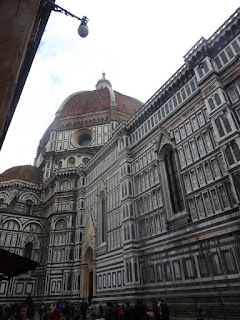 |
| The Duomo with dome |
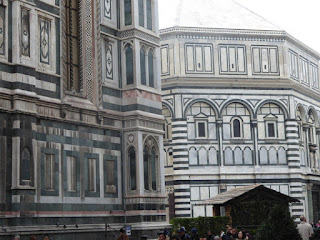 |
| Duomo with the Baptistry |
 |
| Side of the Duomo |
 |
| Front of the Duomo |
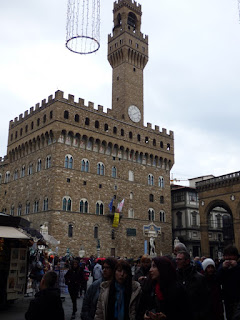 |
| City Hall |
I had been kind of thinking of Florence as a decent place to look for a blue leather jacket and discovered that leather shops were EVERYWHERE and felt like it was just too intimidating to consider. Jim kept egging me on, and on a whim, we walked into one store that was much bigger than it seemed from the front and somehow, I managed to find a blue jacket at a price that would not break the bank. (The first couple I looked at had tags suggesting prices of $1200 to $1500, which was totally not an option.)
We gathered together with our group and took a bus to our next stop near Siena, in a renovated old huge house called Villa San Lucchese in Poggibonza. On our way, we stopped at an American Cemetery for 4400 WWII casualties. It is much smaller than Normandy, which we visited in 2002, but has a similar impact. We were there near the end of the day, had a conversation with the cemetery superintendent, listened to the recitation of taps, and the 4 veterans and 2 other volunteers assisted with lowering and folding the flag. Jim was one of the volunteers, and as a person who avoids giving direction, was the most vocal about what to do and how. During his Viet Nam war experience, he was tasked with notifying next of kin and had experience in preparing the flag for presentation.
 |
The folks who lowered the flag: Herbert, Ed, Jim, Dennis,
Paul, and Diane |
Shortly after that, we reached our hotel for the next three days and settled down to a wonderful dinner.










































This is bringing me back to my days of art history!
ReplyDelete